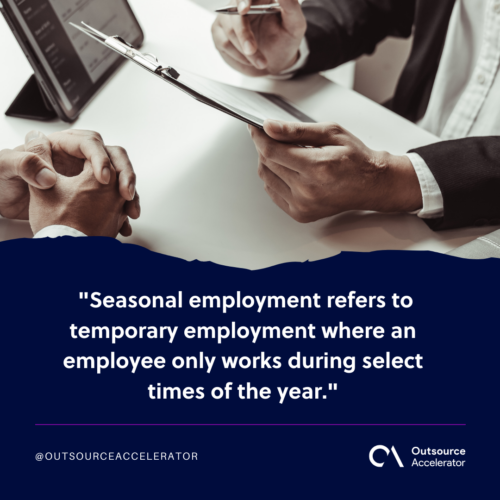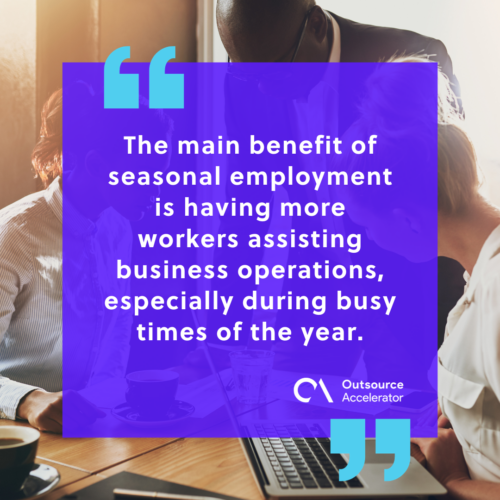Understanding seasonal employment

For businesses to run effectively during the busiest times of the year, employers often resort to hiring seasonal employees.
Having some extra helping hands on deck allows businesses to maintain their momentum during peak season and fill in for employees off during vacation.
Learn about seasonal employment and how it can benefit your business.
What is seasonal employment and how does it work?
Seasonal employment refers to temporary employment where an employee only works during select times of the year.
This applies to businesses that only open during specific times of the year or when operations are at their busiest, such as during holidays.
The length of seasonal employment may vary depending on the business. A seasonal employee’s position may last for a few weeks to months.
Some seasonal staff are usually on part-time setups, while others are on full-time employment.

Industries where seasonal employment applies
There are several industries that implement seasonal employment. Listed below are some of the common ones:
Tourism
Tourism is one of the most common industries that hire seasonal employees. This is especially true during peak season, when more people are traveling.
People and their families will be booking hotels, resorts, and rentals to stay at. Managers running these establishments hire seasonal employees to help accommodate the guests.
Seasonal employees also come in handy in tourist attractions, such as amusement parks, beaches, and landmarks.
Another example is ski resorts, which will hire additional staff, instructors, and snowplow drivers during winter.
During summer, swimming pools will hire more lifeguards and pool maintenance staff, and summer camps enlist the help of extra counselors.
Retail marketing
You can also expect increased customers during the holiday season if you work in retail marketing.
The holidays are an ideal time to hire additional employees to help out with operations. They may be tasked to do shelf stacking, gift wrapping, or running the cashier.
For example, shoppers will flood various stores during Black Friday, and seasonal staff can help manage large volumes of customers.
Other holidays where retail shops may benefit from seasonal employment include Christmas, Mother’s Day, and Father’s Day when people are out shopping for gifts.
Delivery service
Many families and large groups order delivery services during the holidays. They would rather order online to avoid the crowds because restaurants are full this season.
Apart from food, people order gifts online for their friends and families. This is a good opportunity to hire additional staff, such as drivers.
Restaurants
Restaurants also benefit from hiring seasonal employees, especially during the holiday season.
As mentioned earlier, restaurants are usually full and crowded during holidays, which increases the need for additional servers and chefs.
Agriculture
Farmers thrive during specific seasons of the year, which calls for the assistance of those looking for seasonal employment in agriculture.
Some of the work may include planting or harvesting crops, managing livestock, tending to landscape, and operating machinery.
Benefits of seasonal employment
Seasonal employment has several advantages. Here are some of the reasons why companies hire seasonal workers:
Increase efficiency
The main benefit of seasonal employment is having more workers assisting business operations, especially during busy times of the year.
Businesses can accomplish tasks quicker and more efficiently despite having a higher number of customers.

Cost-effective
Seasonal employees are a cost-effective solution. They are hired part-time or temporarily, meaning companies do not have to pay them as much as full-timers.
Salary-wise, employers do not have to pay them all year and provide them with insurance, paid time off, or retirement benefits.
Meet customer demands
As the holidays approach, so does an increase in demand from customers. Without enough staff to cater to these demands, customers will feel unsatisfied.
Seasonal employees are hired to meet the customers’ needs during holidays. As a result, it increases customer satisfaction.
Cover for absent employees
Employees take time off work during holidays and vacations, and businesses will need people to fill their positions. This is where seasonal employment comes in.
Seasonal employees can cover the shifts of these absent employees to keep the business running. Operations continue as normal, and employees are ready to assist customers whenever they need it.
Maintains quality standards
Seasonal employees can help maintain consistent standards by providing the same level of service as the other staff members. The quality of service will be unaffected, and the business can accommodate its customers, regardless of the season.
Challenges of seasonal employment
While seasonal employment may be an effective way to keep business going, it also has its drawbacks.
Time-consuming process
Just like any other employee, seasonal employees must be recruited and trained to do the job, which may take some extra time and resources.
It may be difficult to find seasonal employees as there may not be many people willing to work during holidays or peak season.
Potential staffing gaps
The number of seasonal employees hired may not be equal to the number of employees that need to be filled in.
For example, if five employees are absent for the holidays, only one employee may be available to fill in. A shortage in staff may cause tasks to be halted or delayed, which may slow down operations and affect customer experience.
Employee turnover
Some employees may not be as committed to the position as others, requiring employers to rehire and retrain new employees constantly.
A fixed roster of employees with the right experience is ideal as they are already familiar with the job, and operations will remain consistent every year.
Difference in skill level
Seasonal employees can vary in skill level, depending on the nature of the job.
For example, if two seasonal employees are hired to fulfill the same role, but one does their job worse than the other, it will be obvious to the employers and customers.
An incompetent employee is not a good look for any business and may cause customers to turn away.
Seasonal employment laws and regulations
Employers must adhere to the Fair Labor Standards Act, which states that seasonal employees must receive federal or state minimum wage.
They are also entitled to overtime pay if they work more than 40 hours a week. Children aged 14-15 can only work for a limited time and under permitted occupations.
When the child turns 16, there are no limits to how many hours they can work, but are not eligible to work in hazardous conditions.
Seasonal employees must also adhere to the same tax regulations as other employees. These regulations may vary depending on the state or local employment laws.
Tips for managing seasonal employment
If your company is looking to hire seasonal employees, follow these tips to ensure the process goes smoothly.
Recruit early
When recruiting new employees, do not wait until the season arrives. Waiting until the last minute will not give you enough time for training.
Start looking for potential employees early, months before peak season arrives. Other companies will be hiring as well, so make sure you get a headstart.
Create your job postings and use the time to your advantage. Doing so gives you more time to shortlist your candidates before they officially start.
Treat seasonal employees fairly
Even though you are only hiring temporary employees, it is still important to treat them just as you would any other employee. Doing so creates a positive work environment for all staff, regardless of status.
Treating an employee well and fairly gives them a good reason to come back the following year when you need the extra help again. Plus, your employee could put in a good word for you to future seasonal workers.

Take note of the standout employees
Every year, some seasonal employees prove themselves to be great at their job, so it would be a loss to see them leave so soon.
Take note of your top performers so you have a reference of who to hire the following year. It saves you the hassle of recruiting and training because you already have someone experienced and competent.
Seasonal employment as a modern strategy:
Businesses are more open to less rigid work setups if it means helping their operations with certain tasks; seasonal employment is an example of this.
Hiring seasonal employees keeps businesses moving and allows them to be flexible. They can adjust their staff to meet demands and ensure that assistance is always available.







 Independent
Independent




